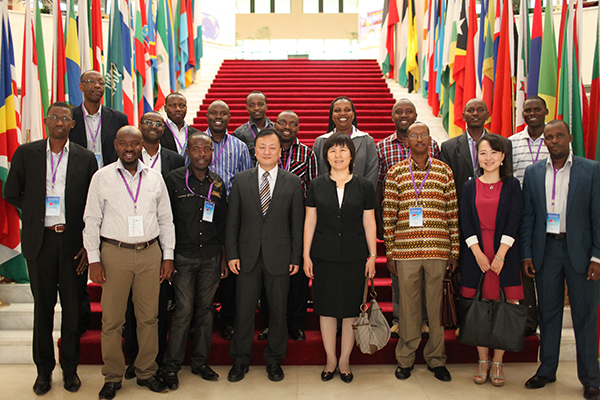

With the deepening ties between China and many African countries, both regions have grown in economic strength in a mutually beneficial manner. Currently, rural development and poverty reduction are the top priorities of many developing African nations. In order to help these countries better understand China’s experiences in these areas, China’s Ministry of Commerce hosted, along with cohosts the Academy for International Business Officials (“AIBO”)and the National School of Development at Peking University (“NSD”), the 2014 Rwanda Rural Development & Poverty Reduction Workshop for Rwandan delegates in Beijing.
On 28 August, 2014, the opening ceremony of the 2014 Rwanda Rural Development & Poverty Reduction Workshop was held at the Ministry of Commerce Academy of International Business Officials’ Seminar House.
AIBO Vice Secretary Luo Hong gave a brief introduction to the AIBO’s historical development and successes, highlighting the high pace of growth for Sino-Rwandan trade in the past 40 years, constant dialogue between the two nations’ top leaders, continuously growing partnerships in many sectors, as well as China’s willingness in its position as the world’s largest developing economy to interact with the world’s developing nations, using its own experience to promote information sharing and to increase mutual trust and communication. In addition, Secretary Luo underlined that the workshop is based on the China model, China’s rural development and governance as well as rural healthcare systems, and, during the research phase, students will undertake field studies in Shanghai and Yinchuan so that Rwandan commerce officials can better understand China’s rural and country-specific conditions.
During the opening ceremony, Peking University National School of Development Beijing International MBA (BiMBA)’s Academic Dean, Du Guiying introduced the NSD’s key role in tackling China’s issue of development and economic growth. The NSD’s professors and scholars have gained their PhDs at the world’s top schools and have devoted themselves to researching China’s economic development and associated issues in order to make significant contributions to the country’s growth. One of the NSD’s distinguished representatives is Honorary Dean and former World Bank Chief Economist and Senior Vice President Professor Justin Lin. Professor Lin is dedicated to eliminating world poverty: “As long as there are those in the world living in poverty, we are all living in poverty. As long as there are those in the world in hardship, then we are all living in hardship.” In July of this year, Professor Lin led two Chinese business delegations to Rwanda to increase Chinese investment into Africa to stimulate African economic growth and accelerate economic structural adjustment in China, for which Professor Lin personally received by Rwandan President Paul Kagame. Academic Dean Du Guiying pointed out that the heavy responsibilities that NSD scholars bear have led the NSD to become China’s premier think tank. Ms. Du closed her speech with a quote from General Secretary Xi Jinping during the Boao Forum in 2013, “A single flower does not make spring while one hundred flowers in full blossom bring spring to the garden”. She hopes that China and Rwanda will be work together relentlessly to reach this shared vision.
Finally, head of the workshop, Augustin Mutrah showed his appreciation on behalf of the Rwandan delegation to his Chinese hosts. Mr. Mutrah said that Rwanda has formulated the development plan for 2020, with its aim for economic growth, to improve rural living standards, improve governance and to achieve a vision of self-reliance. The Rwandan delegates from cooperation agencies present at the workshop expressed their desire to take back the skills and learning after 21 days’ study to benefit to their populace.
The 2014 Rwanda Rural Development & Poverty Reduction Workshop opening ceremony concludes successfully, with a meaningful beginning to a mutually beneficial Sino-African strategy, increasing mutual trust and promoting exchanges of experience.